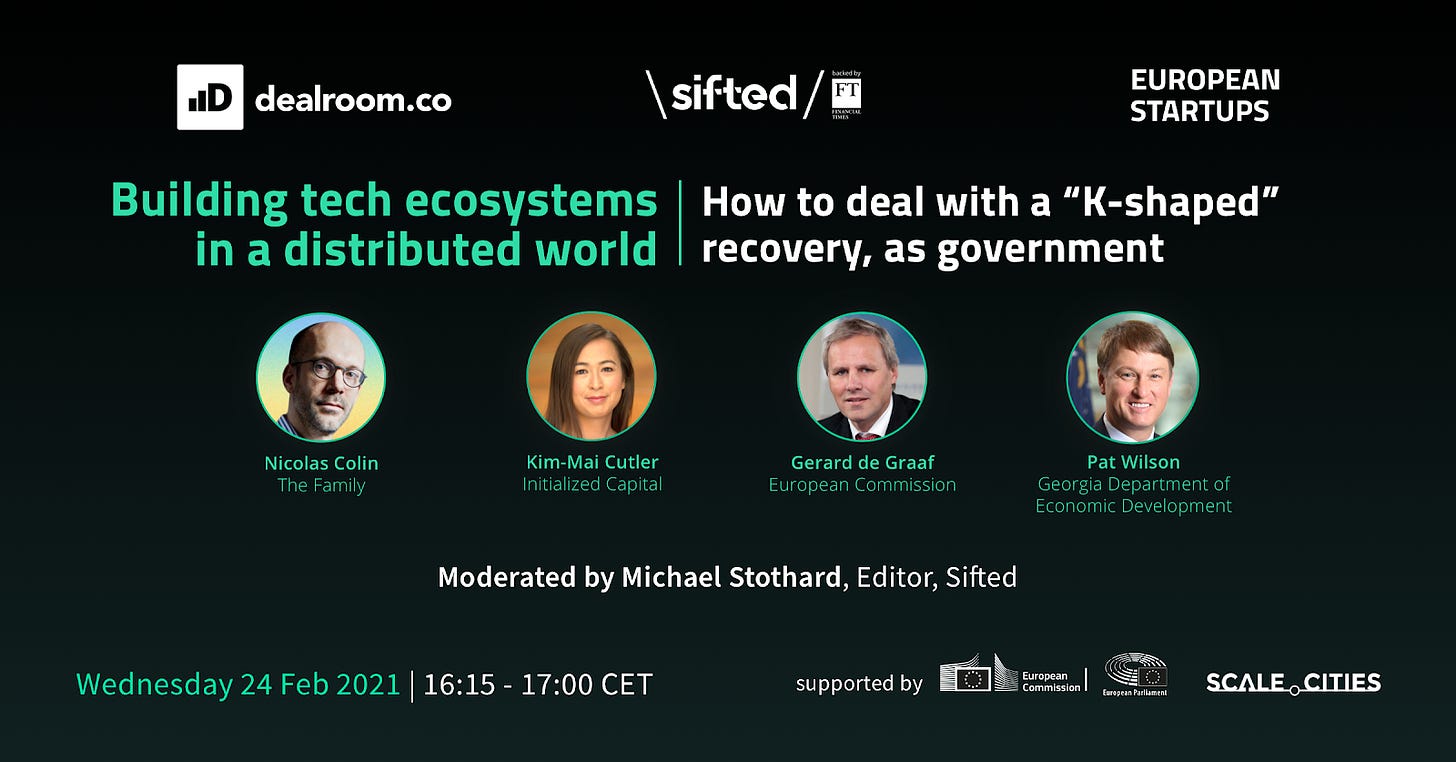Clubhouse in Europe. All About Angel Investing. Vaughn Tan on Uncertainty. SPACs.
Today: My column in “Sifted” about why Europeans suck at social media. Recent essays (and interviews!). Space is the new startup.

The Agenda 👇
In Sifted: It’s time for European founders to build social media platforms
Angel investing done right, with Pascal Levy-Garboua (+ Part 2)
Dealing with uncertainty with Vaughn Tan
A deep dive on SPACs: here’s a first round
In my latest Sifted column, I take the rise of Clubhouse to ask an important question: Why hasn’t Europe built its own social media giants? Up until recently, one could have made the claim that only Silicon Valley had the playbook for building a social media platform with global reach. But TikTok’s explosion onto the scene has shown that there are other playbooks out there—if only entrepreneurs and investors are willing to discover them. But that does lead me to another big question: Are Europeans really open to building those kinds of platforms?
👉 Read the whole column on the Sifted website: Why can't Europe build a Clubhouse?
⏳ “Be Patient” | A Conversation About Angel Investing w/ Pascal Levy-Garboua
It’s not surprising that many people are becoming more interested in angel investing these days, hoping to both support companies that they think match the coming Entrepreneurial Age and enjoy significant returns. But like so many things, it’s obviously not that easy. And that’s why I was so happy to sit down and speak with Pascal Levy-Garboua recently about his experiences in angel investing and how European angel investors specifically can best achieve their goals.
As a French person whose career developed in Silicon Valley, Pascal has a useful perspective on how Europe’s startup ecosystems can evolve in terms of angel investing. We talked about whether European angels can access enough deals in enough geographies to avoid needing to make oversized early bets, the difficulties of investing in consumer companies when you’re not an expert on the local culture, and how the kinds of exits you can expect—whether IPOs or acquisitions—depend on the types of companies that an ecosystem is churning out.
One point that Pascal made in particular struck me as quite important. He noted that many of his best angel investments came not at the moment of “exit”, but rather with the rapid scaling on an expanding market by the larger tech company that acquired the startup in which he’d invested. When this kind of acquisition is made via shares rather than cash, a patient angel investor can find that their own journey toward returns runs longer than that of the original target company itself.
👉 If you’re interested in angel investing, I dare say the subscription to European Straits can likely be justified by just these two editions of "Be Patient" | A Conversation About Angel Investing w/ Pascal Levy-Garboua (Parts 1 and 2).
🔮 Vaughn Tan on Uncertainty
My latest guest who came in to speak with The Family’s current batch of startups was Vaughn Tan, author of The Uncertainty Mindset. This isn’t the first time his work has featured in this newsletter, and with good reason: I find it to be a key work, with Vaughn being one of the most inspiring, fresh voices in the field of business strategy.
I enjoy these kinds of conversations, because in speaking with experts coming from other fields, I can find new ways of thinking and reflecting—such as with Vaughn’s use of the term ‘totipotency’, “the ability of a cell, such as an egg, to give rise to unlike cells and to develop into or generate a new organism or part”. Although it comes from biology, it’s an idea that fits quite well in a business context, especially when reflecting on the difference between risk and uncertainty.
One key aspect of our conversation circled back to something we’ve long said at The Family, namely that entrepreneurs shouldn’t be wasting their time coming up with a business plan. This is due to a simple fact of life for a startup, in that you have neither an established business model nor any real way of predicting what it will eventually be. But Vaughn points out that it’s also true because of the increasing uncertainty in the world, meaning the best approach is a step-by-step approach that lets you constantly learn and adjust, with both successes and failures continually adding value to your company.
👉 I summed up his thoughts and added a bit more, including a list of definitions of business strategy sent in by one of my readers, in Vaughn Tan on Uncertainty.
🤑 Some Quick Notes on SPACs
There has been more and more noise lately regarding one option in particular for taking companies onto public markets: the SPAC. SPACs are listed companies whose sole purpose is to find other (private) companies to acquire, thus effectively taking those target companies public without going through an IPO. And even as IPOs have become a bit more common recently, SPACs continue to garner quite a bit of press and big-name proponents.
Some of this can simply be linked to the fact that although we’re in a world awash in capital, a great deal of that money still struggles to find its way into private markets. In addition, retail investors are seeing that much of the value creation in today’s economy is happening in companies that aren’t available to them, meaning that a pathway that opens up access to those returns—like an SPAC—is quite attractive indeed.
I haven’t yet delved far enough into the topic to know exactly how I feel about SPACs, but I do know one thing: putting one together is in no small part predicated on its connection with a powerful brand. This has led to some strange associations in the SPAC world, where you can find companies being fronted by former Speaker of the House Paul Ryan or blackballed NFL quarterback Colin Kaepernick.
👉 I start pulling on some threads in Some Quick Notes on SPACs.
Sounds interesting? Subscribe to European Straits and let me know what you think!
🚀 One of the startups in The Family’s current batch is Dark, and it’s a great example of how something that is complex isn’t necessarily complicated. Its founder, Clyde Laheyne, is an actual rocket scientist, aiming to reinvent the way satellites are put into space. He wrote about what drew him towards this challenge, why the industry needs the change he envisions, and the current state of affairs in this newsletter: 2030: A Rocket Odyssey. Enjoy, and subscribe!
🦅 As you know, each day The Family’s directors are sending a newsletter on various topics related to startups and growing businesses in the Entrepreneurial Age. Over the past week, I’d particularly draw your attention to two of these (although you can of course check out every edition right here): Balthazar de Lavergne’s The Great Divide, where he presents a novel argument for how one should view the stock market and company valuations today; and Oussama Ammar’s Anyone can become a creator, looking at the explosion of the creator economy and its implications for both individuals and startup founders.
⚠️ Finally, next Wednesday (Feb. 24), I’ll be taking part in an online discussion on how tech ecosystems are built, sponsored by Sifted and Dealroom. I’m particularly excited as the panel also features one of the writers who I cite quite often here, Kim-Mai Cutler—do join us!
From Away From the Bay Area (January 2021):
Kim-Mai Cutler, a partner at the VC firm Initialized, is also a former journalist at TechCrunch and the author of some of the best pieces of writing I’ve ever read about Silicon Valley. A few days ago, Kim-Mai shared some figures and thoughts on Initialized’s blog about the current trend of tech companies leaving the Bay Area. Based on what she wrote, it’s not that new of a trend, but instead one that’s been happening for many years. As on many other fronts, the pandemic has only contributed to accelerating a pre-existing trend.
All recent editions:
Some Quick Notes on SPACs—for subscribers only.
Vaughn Tan on Uncertainty—for subscribers only.
“Be Patient” | A Conversation About Angel Investing w/ Pascal Levy-Garboua (Parts 1 and 2)—for subscribers only.
The Digital Economy w/ Bill Janeway. Reinvention. Bezos. Musk. Communications.—for everyone.
Does Elon Musk Master Productive Uncertainty?—for subscribers only.
Martin Schmidbaur on Communications—for subscribers only.
11 Notes on Jeff Bezos—for subscribers only.
Co-Investing in Corporate Reinvention—for subscribers only.
The New Welfare State w/ Hilary Cottam. Remote Work. Business Strategy. GameStop. Jim Simons.—for everyone.
European Straits is a 5-email-a-week product, and all essays are subscriber-only (with rare exceptions). Join us!
From Munich, Germany 🇩🇪
Nicolas









